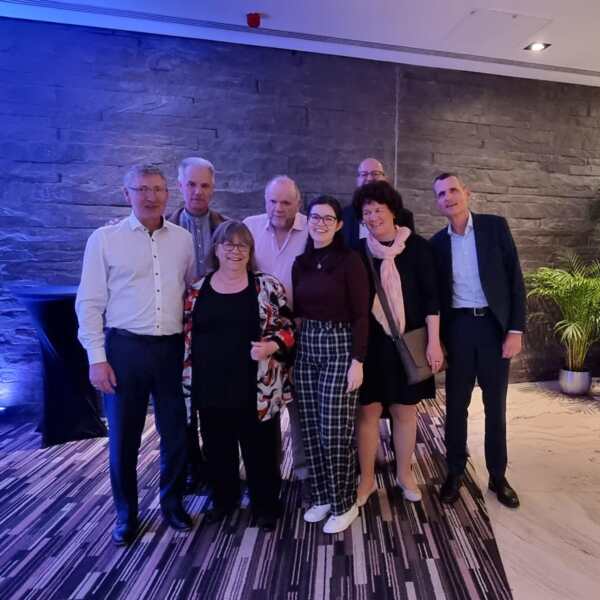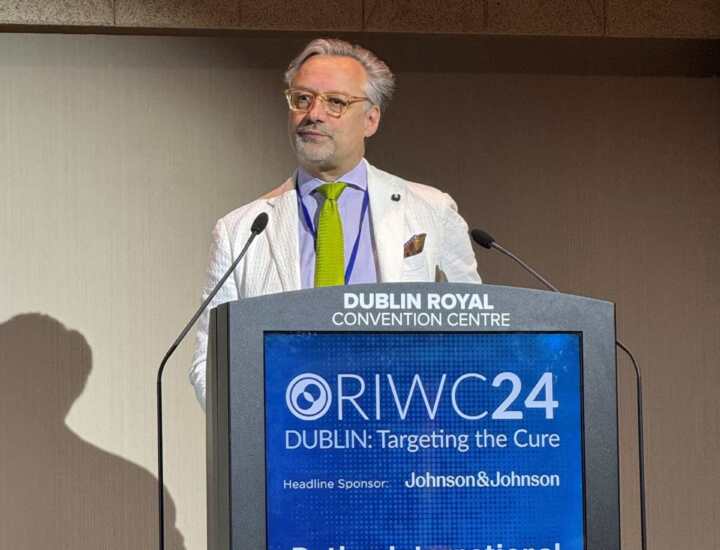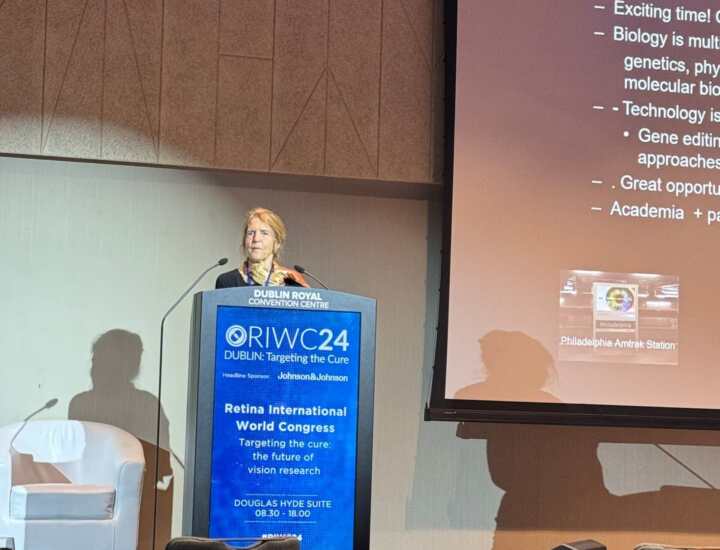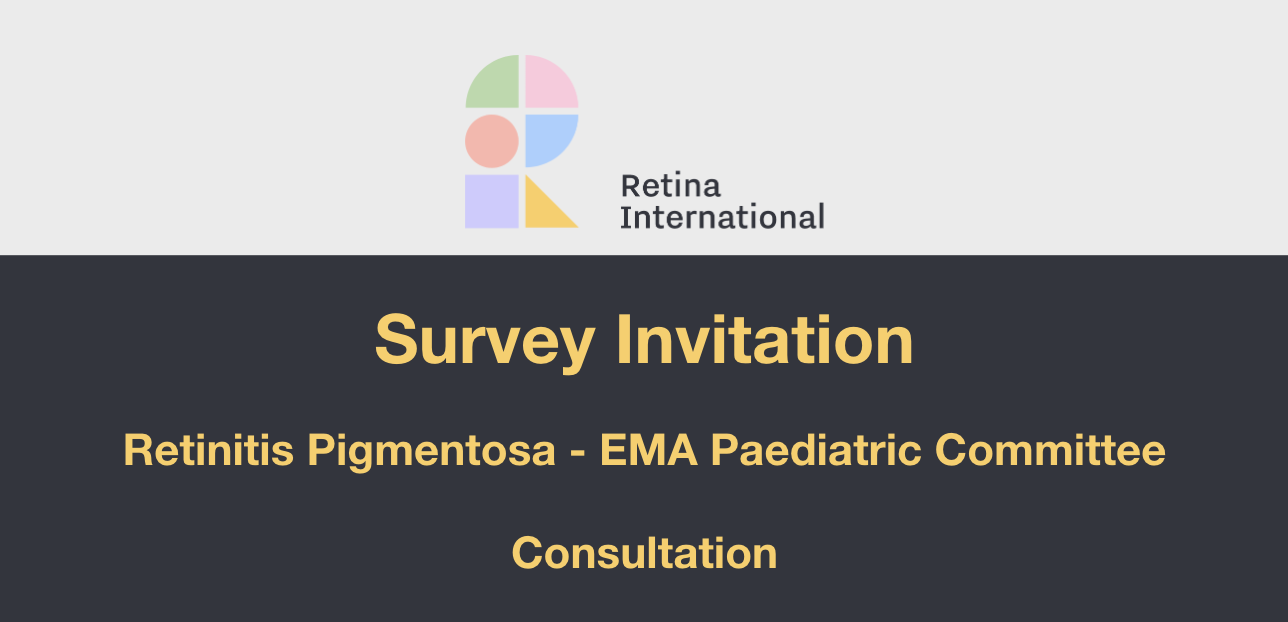8 July, 2024
The Retina International World Congress (RIWC24), hosted by Fighting Blindness Ireland, took place at the Dublin Royal Convention Centre from June 5-8, 2024. The event brought together a global community dedicated to retinal research and innovation with the theme of “Targeting the Cure”. This Congress continued to nurture and develop the great hope and optimism that emerged from the previous congress held in Iceland in 2022.
During the four days of the Congress, members of Retina International, who represent patient groups from all continents, along with leaders in the scientific space including renowned ophthalmologists, optometrists, industry representatives and regulators, as well as interested members of the inherited retinal disease community, participated in a comprehensive programme in which groundbreaking research was shared and collaboration fostered.

Summary of the Congress
The opening event on Wednesday June 5th was the Retina Youth Council Meeting. Here members of the international youth community met to discuss the progress of research, to share experience on coping with a progressive form of sight loss and to find solutions to improve daily living. The group also had a session on dance and finished the day with a fun trip on Dublin’s River Liffey on the Viking Splash Tour.
Also, on June 5th, I participated in a Patient Advisory Board facilitated by Retina International. Patient representatives from seven countries discussed the impact of Geographic Atrophy on the affected individuals, on those who care for them, and their attitudes on the burden of treatment. The information collected as a result of the discussion will help the Retina International team to develop awareness building tools for all stakeholders that is accessible and educational. The advisory group will continue to meet online to progress discussions.
On Thursday June 6th, the Retina International Annual General Meeting (AGM) took place in the morning. At the meeting Marina Leite from Retina Brazil, was elected to the Board of Directors of the organisation. Marina’s addition means that the Board of Directors represents patients in Australia, South Africa, the United States of America, Europe and South America. Also, at the AGM Foundation Fighting Blindness USA was successful in its bid to host the Retina International World Congress in 2026. I look forward to sharing more details regarding the next congress soon!
Following the AGM the Retina International Continuous Education Programme allowed team members of Retina International to inform the community on their outputs from 2023/24. This was followed by an update on the membership restructure from Caisa Ramshage (Sweden) and David Sanchez (Spain) who are members of the Retina International Board of Directors. Nabin Paudel, head of research and programmes for Retina International, then provided a report regarding Retina International’s current and previous actions on Geographic Atrophy and Andrew Ryan, communications and engagement officer Retina International, spoke about the activities of the Retina Youth Council team. Members of the organisation, including myself from Retina Australia, then provided presentations which were highly informative quick-fire updates on programmes that we have engaged in over the past year. The breadth of activities being conducted throughout the world were inspiring and informative.
During the afternoon, Retina International ran a Workshop on the issue of “Value”. An overview of clinician, industry and patients’ perspective, with the potential for actions to be taken to improve understanding of what value means in the inherited retinal disease community, was provided by Professor Bart Leroy, Ghent University (pictured right), Dr Tom Denee, Johnson & Johnson, Marina Leite, Retina
Brazil, and Dr Sarah McLoughlin, Cancer Trials Ireland. A panel session providing the experience of stakeholders in the community, where and why challenges exist for IRDs, how the patient community can co-create ways to change the perception of IRDs and how they can bring the patient voice to decision making forums was chaired by Jason Menzo, CEO Foundation Fighting Blindness USA. The panellists were, Dr Daniel Chung, Sparing Vision, Mr Russell Wheeler, LHON Society UK, Ms Silvia Cerolini, Eyes on the Future, Mr Stephan Hüsler, CEO Retina Suisse and Professor Elise Heon, Sick Kids Hospital Toronto. The workshop finished with an open discussion on the broader perspective and literacy among patients, researchers and clinicians, chaired by Dr Derick Mitchell, CEO of the Irish Platform for Patients Organisations Science and Industry. Dr Mitchell will work with the Retina International team on determining the “next steps”.


The Retina International World Congress (RIWC24) science programme was delivered on Friday June 7th, and the audience was treated to nine hours of world leading and ground-breaking retinal research presentations. The opportunity for questions and answers, and panel discussions, to share perspectives of all stakeholders on the challenges and opportunities to improve the lives of those affected by retinal conditions was also included.
Professor Jean Bennett, University of Pennsylvania, (pictured left) provided the keynote address: “Shared Vision: Academic-Patient Partnerships in Gene Therapy Research”. Jean spoke about the progress in gene therapy during the previous 34 years, providing examples of her contribution to research. She mentioned how exciting the future was because of the significant number of clinical trials around the world and of the evolving technologies in gene editing and of how promising this was for those affected by inherited retinal diseases.
A number of presentations provided by researchers from London, Paris, Oregan, Pittsburgh, Philadelphia and Dublin, with the theme of “Therapeutic Development” followed, and included information about: clinical trials for inherited retinal diseases, the use of CRISPR and gene editing in treating specific forms of retinitis pigmentosa, the development of patient care pathways, retinal degeneration in ciliopathies and the use of sea allergens, gene therapy for children with AIPL1 gene defects, gene agnostic approaches, optogenetics, pre-clinical drug screening using zebrafish, and the identification of targets for other diseases which could be applied to degenerative eye disease. It was fascinating to learn of the breadth and depth of the research that is currently being carried out. It was also wonderful to see the passion of the researchers who obviously love their work, enjoy discussing it, and are clearly very keen to find breakthroughs which will ultimately lead to treatments and improved vision for those living with differing forms of inherited retinal disease.
During the early afternoon, we listened to eminent professors: Helene Dollfus, University of Strasbourg – France, Bart Leroy, University of Ghent – Belgium and Frans Cremers, University of Nijmegen – The Netherlands discuss the “Genetic Architecture of Retinal Degenerations and Diagnostic Methods”. We all learnt about several conditions currently being studied intensely including: Leber Congenital Amaurosis, Achromatopsia, Stargardt Disease, and Congenital Stationery Night Blindness; along with the many clinical issues to be considered before gene therapies will become available. The take home message was that there are many novel therapies on the way with some being gene dependent and therefore it is critical for everyone with an inherited retinal disease to undertake genetic testing in an endeavour to learn of their specific genetic disposition.
After this, participants heard about studies currently being undertaken in Maryland, Texas and Dublin, in relation to age-related macular degeneration with specific reference to artificial intelligence, outcome measures in clinical trials, and the inner retina. These talks by Drs Tiarnan Keenan, David Birch and Jeffrey O’Callaghan were extremely informative as they tackled completely different aspects of research to other speakers, indicating the complexity of research and the common goal to improve the lives of people affected by inherited diseases.
The final session of the Retina International World Congress (RIWC24) included a panel discussion in relation to “High unmet medical needs in retinal degenerations”. The theme of this discussion was that all parties need to talk with each other and specifically those involved in manufacturing products for use in the therapies, so that the quality of the products is of the same standard and suitable for general use, wherever it is produced. It is also clear that there are opportunities for advocacy with the regulators in various countries as opportunities for patients may be lost if a treatment is approved in Europe, for example, and not in the USA or elsewhere. Overall, the combined message was that there were opportunities for researchers and patient organisations across the world to combine their voice to ensure that no time is lost in ensuring that those living with degenerative diseases have an opportunity to preserve their sight in the first instance and then move towards targeting a cure in the longer term.
At the Retina International World Congress (RIWC24) speaker’s dinner following the scientific sessions, Professor Elise Heon, The Hospital for Sick Children Toronto, was presented with the Lifetime Achievement Award by Retina International for her tireless work to improve the lives of people living with retinal dystrophies, for her engagement with the organisation and its members, her availability for advice and the valued support she continues to give the IRD community.
Saturday June 8th was a day focused on engagement with patients and researchers and commenced with a moving performance by the Fighting Blindness Visionaries Choir. The choir first came together approximately ten years ago as a group of blind or vision impaired people interested in singing and have now grown into an acclaimed choir that regularly performs at choral festivals and by invitation to other events.
The programme comprised panel discussions to talk about patient needs with consideration given as to how and why it should be included in the development of endpoints for clinical trials and in the regulatory process. The issue of mental health came to the fore in the panel discussions with strong input from the audience on the supports needed, and the considerations that must be made by clinicians at the point of diagnosis.
This was followed by sessions on Patient and Public Involvement in research, a session on Artificial Intelligence, a live Podcast and then breakout sessions for those affected by inherited retinal diseases or age-related macular disease. A live Spanish panel for those coming from Spain and South America also took place. Some interesting facts presented during this time included that there are estimated to be 5.4 million people worldwide who suffer from an inherited retinal disease and currently 325 genes have been found as causing such diseases.
The closing address was provided by Professor Bart Leroy, University of Ghent, Belgium who eloquently summarised the entire programme by mentioning each speaker and panellist and provided a brief description of the scientific learnings from the meeting and the themes presented. He then concluded with some “Key Take Aways” which included the fact that patients are partners and should feel empowered to contribute to the innovative science which is all around us. His final words were “Let’s build a better future together”.
LEIGHTON BOYD AM – CHAIR RETINA AUSTRALIA
https://retinaaustralia.com.au/report-on-the-retina-international-world-congress-riwc24/
Other Blogs

Have your say – First GA treatment being considered for PBS subsidy
Do you have geographic atrophy? If you or someone close...

World Research Summary by Dr Catherine Civil
Hot Off The Press Check out below to see what new inherited retinal disease (IRD) therapies are in the pipeline. I...

EMA Survey – Input from People Living with Retinitis Pigmentosa
Invitation to participate Through Retina Australia's membership with Retina International,...
